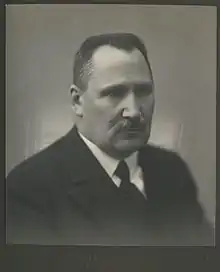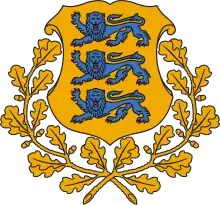Jüri Jaakson
Jüri Jaakson VR III/1 (16 January [O.S. 4 January] 1870 in Karula, Kreis Fellin, Livonia, Russian Empire – 20 April 1942 in Sosva, Sverdlovsk Oblast, Soviet Union) was an Estonian businessman and politician.
Jüri Jaakson | |
|---|---|
 | |
| 6th State Elder of Estonia | |
| In office 16 December 1924 – 15 December 1925 | |
| Preceded by | Friedrich Karl Akel |
| Succeeded by | Jaan Teemant |
| Personal details | |
| Born | 4 January 1870 Karula, Kreis Fellin, Livonia, Russian Empire |
| Died | 20 April 1942 (aged 72) Sosva, Sverdlovsk Oblast, Soviet Union |
| Political party | Estonian People's Party |
Life and career

Jaakson studied in H. Treffner's Private High School and studied law at Tartu University from 1892 to 1896. He graduated with a 1st degree diploma (simple graduation). In 1897-1914 he worked as lawyer firstly in Viljandi, and later in Riga. In 1915-1919, Jaakson was a member of the board of the Tallinn City Bank (Tallinna Linnapank).
Jaakson was a member and assistant chairman of the Estonian Provincial Assembly (Eesti Maapäev) in 1917–1918. In 1918 he was general commissioner of the Provisional Government for taking over property from the German occupation powers. During 1918–1920 he worked as Minister of Justice of the Provisional Government and the Government of the Republic. In 1920–1932 Jaakson was a member of the I–IV Riigikogu. Jaakson was Elder of State from December 1924 to December 1925. In 1926-1940 he worked as president of the Bank of Estonia and was a member of the National Economic Council. Also, Jaakson was member of the National Council (Riiginõukogu, second chamber of the Riigikogu in 1938-1940). Jaakson was founder of several banks and participated in several organizations like the Central Society of the North Estonian Farmers (Estonian: Põhja-Eesti Põllumeeste Keskselts) and the Council of the Tallinn Economic Union (Estonian: Tallinna Majandusühisus).
Death
Jaakson was imprisoned by the Soviet secret service NKVD on 14 June 1941. In Russia he was sentenced to death because of "counterrevolutionary activities" and executed the next year.
Awards
- 1920 - Cross of Liberty III/I
- 1925 - Order of the Three Stars I
- 1925 - Order of the Three Stars, 1st Class with Chain (Latvia)[1]
- 1930 - Order of the Cross of the Eagle I
References
- "Triju Zvaigžņu ordenim 90: apbalvojuma dzimšana, nebūšanas un pārvērtības". LA.LV (in Latvian). Retrieved 2020-11-16.
- Jaakson's biography on the website of the President of Estonia (Old site)
- Ülo Kaevats et al. 2000. Eesti Entsüklopeedia 14. Tallinn: Eesti Entsüklopeediakirjastus, ISBN 9985-70-064-3
